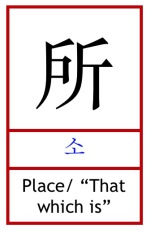Originally published November 2017
This month we are going to look at the character 所 which is pronounced 소(“So”) in Korean and which means ‘place’. It also has the meaning “That which is ____”. We will take a look at the words where it means ‘place’ first, since these are the easiest to recognize.

For example, the word 사무소 (事務所 – “Sa-mu-so”) means office.
It is a combination of 사무(事務- “Sa-mu”) which means ‘office work’ and 소 (所 – “So”) which means place. So together the combined word literally means “office-work-place”.
Example Sentence:
해당 지역의 발권 사무소에 문의하십시오.
(“Hae-dang Ji-yeok-eui Bal-gwon Sa-mu-so-e Mun-ui-ha-ship-shi-o”)
Please contact your local ticket office.
The word 세탁소 (洗濯所- “Se-tak-so”) means cleaners (as in a place that cleans clothes, like a dry cleaner). It is formed by combining 세탁 (洗濯- “Se-tak”) which means laundry and 소 (所 – “So”) which means place. Together the combined word literally means “laundry-place”.
Example Sentence:
현주는 세탁소에서 일했다.
(“Hyun-ju-neun Se-tak-so-e-seo Il-het-da”)
Hyun Joo worked at the dry cleaner’s.
The word 연구소 (硏究所 – “Yeon-gu-so”) means research laboratory. The first part 연구 (硏究 – “Yeon-gu”) means research, and the second part 소 (所 – “So”) which means place. When combined the word literally means ‘research-place’.
Example Sentence:
연구소에서 샘플이 오기를 기다리는 중이에요.
(“Yeon-gu-so E-seo Saem-pul-i O-gi-reul Gi-da-ri-neun Jung-i-e-yo”)
We’re still waiting for some samples to come back from the lab.
Here are some more common words where 所 (소 – “So”) means place:
숙소 (宿所 – “Suk-so”): Lodging
이발소 (理髮所 – “I-bal-so”): Barbershop
장소 (場所 – “Jang-so”): Place, spot, location
주소 (住所 – “Ju-so”): Address
파출소 (派出所 – “Pa-chul-so”): Police substation, Police box
Next we will look at the second definition of 所 (소 – “So”) where it takes the meaning of ‘that which is ____’.
Our first example will be the word 소망 (所望 – “So-mang”) which is a noun that means ‘a wish’. The first character 所 (소 – “So”) means ‘that which is ____’ and the second character 望 (망 – “Mang”) means ‘to wish’. The resulting word 소망 (所望 – “So-mang”) literally means ‘that which is wished for’.
The word 소문 (所聞 – “So-mun”) means rumor. The first character 所 (소 – “So”) means ‘that which is ____’ and the second character 聞 (문 – “Mun”) means ‘to hear’. The resulting combination 소문 (所聞 – “So-mun”) literally means ‘that which is heard’.
The word 소용 (所用 – “So-yong”) means usefulness. The first character 所 (소 – “So”) means “that which is ____” and the second character 用 (용 – “Yong”) means ‘to use’. The result is 소용 (所用 – “So-yong”) or ‘that which is used’.
The word 소위 (所謂 – “So-wi”) means ‘so-called’. Once again, the first character 所 (소 – “So”) means “that which is ____” and the second character 謂 (위 – “Wi”) means ‘to-call’. By combining the characters we get the resulting word 소위 (所謂 – “So-wi”) whose literal meaning is ‘that which is called’.
Here are some other common Korean words that follow the same pattern:
소득 (所得 – “So-deuk”): Income, earnings. Literally ‘that which is earned’.
소속 (所屬 – “So-sok”): Affiliation. Literally ‘that which is joined’.
소원 (所願 – “So-won”): Wish, hope. Literally ‘that which is wished for”.
소유 (所有 – “So-yu”): Ownership, possession. Literally “that which is owned”.
소중 (所重): Precious, valuable, dear. Literally ‘that which is heavy’.
I admit that this month’s Hanja Time was a bit more complicated than most because of that second definition of 所 (소 – “So”) which in Chinese was used as a verb modifier. That a Chinese grammatical marker could find its way into so many Korean vocabulary words is pretty interesting!
Special thanks to Fan Champagne for confirming the Chinese grammar structure was correct!